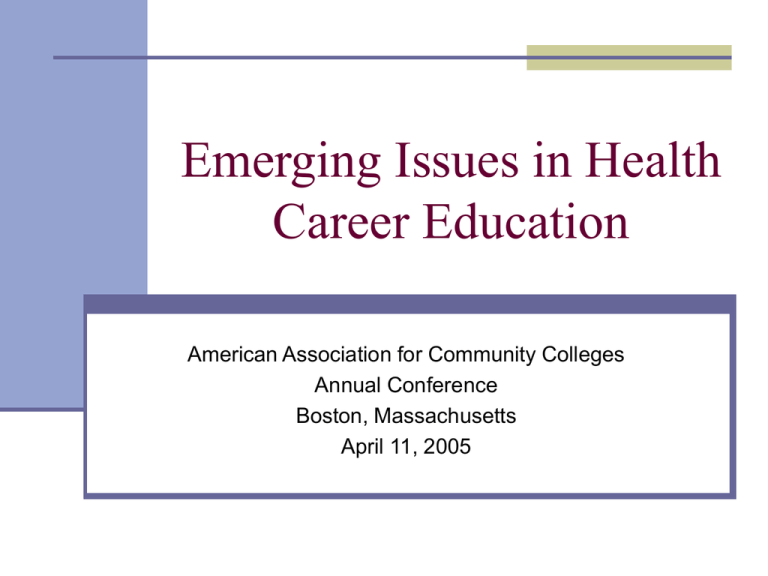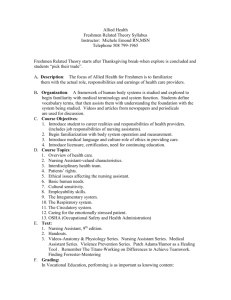Emerging Issues in Health Career Education
advertisement

Emerging Issues in Health Career Education American Association for Community Colleges Annual Conference Boston, Massachusetts April 11, 2005 Panel of Presenters Barbara R. Jones, PhD, Dean of Arts and Sciences Louisiana Delta Community College, Monroe, LA Janell, Lang, EdS Dean, Health Technologies Division Owens Community College, Toledo, OH Carol Miller, PhD Director, School of Allied Health Technologies Miami Dade College/Medical Center Campus Goal To provide participants with solutions to address current emerging issues when planning and delivering health career programs in community colleges Allied Health Education ~ Issues Increased demand for some Allied Health programs Instructional space limitations Limited facility/clinical sites Funding for high cost programs – faculty, equipment, technology Decreased availability of some Allied Health programs Declining enrollments for some programs Funding issues - high cost, low enrollment programs have been closed Difficulty recruiting and retaining applicants Faculty Educational workforce (faculty) are aging and retiring Faculty seeking higher salaries Accreditation Regulations (i.e., JCAHO, OSHA, CAAHEP, NAACLS, CAPTE, etc.) Presentation Overview JCAHO Regulations pertaining to Criminal Background Checks of Faculty and students Increasing Health Career Program Access and Capacity Collaborative Efforts for Delivery of Health Career Programs Health Career Education Organizations Overview on the Status of the Allied Health Reinvestment Act JCAHO Criminal Record Background Checks Carol Miller, PhD Director, School of Allied Health Technologies Miami Dade College/Medical Center Campus Carol.miller@mdc.edu Criminal Background Checks What is driving this effort? How are educational institutions addressing this need? Challenges associated with implementation Determining the guidelines for applicants Health Care Programs Monitor: State Laws JCAHO Standards Individual hospital policies Increasing Health Career Program Access and Capacity Janell Lang,EdS Dean, School of Health Sciences Owens Community College, Toledo and Findlay, OH janlang@owens.edu An Even Greater Need… The “tipping point” in health care in America: the point at which a crisis can become a disaster. Over 600,000 nursing positions will be open by 2012. (U.S. Bureau of Labor Statistics) Allied Health: An Even Greater Need. Health Information Technology Medical language experts who interpret, process, store, and retrieve health information. Employment is projected to increase by 47% by 2012. (BLS) Specializations include: • Coding • Billing • Reimbursement • Transcription Cancer Information Management Cancer registration is the basic method by which information about the incidence, type, extent of disease at time of diagnosis, treatment methods used and survival rates is systematically collected. Laws: • Cancer Registry Amendment Act (Public Law 103-515) 1992 • State Laws: 1993 Medical Laboratory Technology Genetics Stem Cell Research Forensics Cellular structure, chemical composition and functions of normal and abnormal tissue and the skills to prepare, fix, process, embed, section, and stain tissue. Computer technologies and base line analyses. Fields in Homeland Security Paramedic to RN Bridge Program Food Safety Opportunities: Short Term Programs Certified Nursing Assistant Home Health Aide Sterile Processing EKG Phlebotomy Opportunities: One Year Certificate Programs Practical Nursing Polysomnography Medical Coding Medical Billing Medical Reimbursement Medical Transcription Opportunities: Postgraduate Programs Computed Tomography (CT) Magnetic Resonance Imaging (MRI) Mammography Expanding Program Capacities More Challenges Health career education programs are expensive to develop and create Funding for higher education has been cut in many states in recent years Legislatures are reluctant to approve differential tuition for high cost programs Accreditation/Licensure issues Lack of qualified faculty Lack of clinical sites and training space Expanding Program Capacities More Solutions Distance Learning Grant Opportunities Ohio Learning Network Saturday and Sunday clinicals 7P-&A clinicals in specialty areas More community-based clinical education sites Spina Bifida and MDA summer camps The Giving Tree Utilization of college-based clinical sites Disability Services Health Centers Transition to Independent Living Skills Project Collaborative Efforts for Delivery of Health Career Programs Barbara Jones, PhD Dean of Arts and Sciences Louisiana Delta Community College Monroe, LA bjones@ladelta.cc.la.us Why Collaboration? Limited funding Limited physical resources (i.e., space, equipment, technology) Limited faculty Accreditation/regulations Use of available expertise and established programs and resources Institutional Partnerships and Collaborations: Employee/faculty sharing Sharing of Classroom and Clinical space Student tuition stipends or reimbursements Equipment sharing Grants for program development Funds for faculty salary or program support Endowments Continuing education Collaborations Develop collaborations at the institutional, local, state, and federal level to: Increase funding/off-set costs Increase supply of students in the health career education “pipeline” Participate in development and best practices research Increase and improvement of health care delivery to meet community needs Collaborations - Local Medical facilities - institution Faculty sharing Classroom/clinical space Distance learning Funding Stipends Endowments Equipment Donations Medical Centers Vendors Other Tech Prep Local AHEC Collaborations - State Higher Education: Institution - institution Distance Learning Remote site programs Incumbent Worker Training Programs Health Care Workforce Boards Collaborations - Federal National Health Systems (i.e., HCA) Workforce Investment HRSA - Allied Health Project Grants Nursing Reinvestment Act Proposed Allied Health Reinvestment Act Health Career Education Professional Organizations for Two-Year Colleges Health career educational organizations provide opportunities for networking, sharing, and collaborating The purpose of the National Network of Health Career Programs in Two Year Colleges is to promote and encourage innovation, collaboration, and communication among two-year colleges sponsoring health career programs. The National Network is an organization of health education leaders from across the nation from two-year colleges dedicated to: Promoting and encouraging innovation, collaboration, cooperation, and communication with two-year colleges sponsoring health career programs Developing new leaders in health career education Expressing and advocating the interests of health career programs in two-year colleges (i.e., accreditation issues, practice issues, federal policy issues, etc.) For information Executive Director Cullen Johnson 714 Harsh Road Marblehead, OH 43440 Phone: 1-800-592-1299 pin# 50 Email: texascj@bright.net http://www.nn2.org National Organization for Associate Degree Nursing (N-OADN) N-OADN is the leading advocate for associate degree nursing education and practice, and promotes collaboration in charting the future of health care education and delivery. National Organization for Associate Degree Nursing (N-OADN) N-OADN strives to Maintain eligibility for registered nurse licensure for graduates of associate degree nursing programs. Educate students and promote AD nursing programs at community colleges nationwide. Provide a forum for discussion of issues impacting AD education and practice. Develop partnerships and increase communication with other professional organizations. Increase public understanding of the role of the associate degree nurse. Participate at national and state levels in the formation of healthcare policy. Facilitate legislative action supportive of the goals of NOADN. National Organization for Associate Degree Nursing (N-OADN) For information: Executive Director Belinda E. Puetz, PHD, RN 7794 Grow Drive Pensacola, FL 32514 Phone: (850) 484-0514 Fax: (850) 484-8762 Email: bepuetz@puetzamc.com http://www.noadn.org Other Organizations American Association of Community Colleges (AACC) – Nursing and Allied Health Initiative Area Health Education Centers (AHEC) Health Resources and Service Administration (HRSA) Accrediting Agencies (CAAHEP, NAACLS, CAPTE, etc.) Health Professions Network American Association of Community Colleges (AACC) American Association of Community Colleges (AACC) – Nursing and Allied Health Initiative Roxanne Fulcher Director, Health Professions Policy 202-278-0200, ext. 274 email: RFulcher@aacc.nche.edu Allied Health Reinvestment Act Senate Bill 473 Sponsors: Maria Cantwell (D-WA), Jeff Bingaman (D-NM) and Joe Lieberman (D-CT) More co-sponsors needed Purposes of this bill: Public service announcements Increasing educational opportunities Expanding enrollments in related programs Enhancing workforce through retention programs Developing retention strategies Expanding centers of excellence Developing clinical education Supporting State/Local campaigns Important Legislative Action Needed Watch Communicate Act Questions and Answers Emerging Issues in Health Career Education American Association for Community Colleges Annual Conference Boston, Massachusetts April 11, 2005




